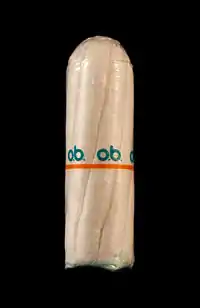o.b. (brand)
o.b. is a brand of tampon, originally developed in Germany in 1950 and manufactured by Carl Hahn GmbH. It is now owned by Edgewell Personal Care. The product was named by the gynecologist Judith Esser-Mittag who also developed it. The initials "o.b." are an abbreviation of the German phrase "ohne Binde" ("without napkin").[1]
 | |
 | |
| Product type | Tampon |
|---|---|
| Owner | Edgewell Personal Care |
| Introduced | March 1950 |
| Markets | Worldwide |
| Previous owners |
|
| Website | ob-tampons |
History
The idea for a tampon which could be inserted without a separate applicator was initiated in 1947 by the German auto engineer Carl Hahn and the lawyer Heinz Mittag. They wanted to introduce tampons to the German market, but the cardboard used for the applicator in the American tampon product Tampax, which at the time dominated the market, was unavailable in post-war Germany. Hahn and Mittag approached Karl Julius Anselmino, director of the Landesfrauenklinik women's hospital in Wuppertal for advice on its design and development. He told them that the job required a woman and recommended the young gynecologist Judith Esser. Esser's finished design went into production in Wuppertal in March 1950. By 2010 the Wuppertal plant had become the largest tampon factory in the world and was exporting to over 30 countries.[2][3]
In 1974 Johnson & Johnson took over Hahn's company and two years later introduced o.b. tampons to the American market with an $8 million advertising campaign on television and radio.[2][4] Esser herself appeared in some of the later American television commercials.[5] Johnson & Johnson introduced o.b. tampons in China in 1993, and as of 2016 they were still the only brand of tampon sold in Chinese stores.[6]
In 2013 the o.b. brand was acquired from Johnson & Johnson by Edgewell Personal Care.[7]
Products

- O.B. ProComfort
- O.B. ProComfort Night
- O.B. Original
- O.B. Compact Applicator
References
- The o.b. Tampon Story. ob-tampons.com. Retrieved 11 December 2016.
- Kraus, Doris (7 March 2010). "60 Jahre o.b.: 'Ein Job für eine Frau'" ("o.b. 60th anniversary: 'A job for a woman'"). Die Presse. Retrieved 11 December 2016 (in German).
- DPA (7 April 2010). "Wuppertaler Watte: Vor 60 Jahren kam der Tampon" ("Wuppertal cotton: 60 years ago, the tampon arrived"). N24. Retrieved 11 December 2016 (in German).
- McDonough, John and Egolf, Karen (eds.) (2015). The Advertising Age Encyclopedia of Advertising, p. 882. Routledge. ISBN 1135949069
- Delaney, Janice; Lupton, Mary Jane; and Toth, Emily (1988). The Curse: A Cultural History of Menstruation, pp. 134–135. University of Illinois Press. ISBN 0252014529
- Yang, Yingzhi (18 March 2016). "China made 85 billion sanitary pads last year, and not one tampon. Here's why". Los Angeles Times. Retrieved 11 December 2016.
- Goodman. Andrew (29 June 2015). "With The Energizer Split, What Will Edgewell Look Like?". Forbes. Retrieved 11 December 2016.